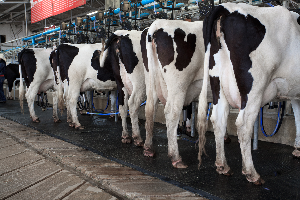SER: heutige Viehhaltung untragbar. Eingreifen notwendig.
Der SER (Sozial-Ökonomischer Rat) kommt in seinem Bericht zur ‘Verschnellerung nachhaltiger Viehwirtschaft’ zu dem Ergebnis, dass verschnelltes Eingreifen in die heutige Viehhaltung notwendig ist. Die Regierung muss sich regional stärker aufstellen und nicht nur die “Vorhut” einnehmen, geschätzt etwa 30% der Viehhalter müsste unterstützt werden. Der Rest müsste die Möglichkeiten bekommen aufzuhören. Die Partei für die Tiere ist mit den Empfehlungen des SER einer Meinung. Ebenfalls mit der Folgerung, dass die Zeiten der Selbstregulierung und guten Vornehmen vorbei seien. Fraktionsvorsitzende Marianne Thieme will eine Debatte mit dem Staatssekretär über diese dringenden Empfehlungen.

Laut SER ist es essentiell, die Vorhut von nachhaltigen Viehhaltern, die unter anderem auf das Wohl der Tiere, die Volksgesundheit und auf Innovation achten, zielgerichtet zu unterstützen. Der SER ist genauso wie die Partei für die Tiere der Meinung, dass es für die Regierung eine starke regionale Rolle gibt, damit die Nachhaltigkeit in der Landwirtschaft endlich in die eigene Hand genommen wird.
‘Zurecht sagt der SER, dass die Zeit der Unverbindlichkeiten und der leeren Versprechungen der Viehhaltung vorbei ist’, sagt Marianne Thieme reagierend auf die SER Empfehlungen. ‘Die Viehhaltung ist untragbar, für Bauern sowie für Tiere, Umwelt und die Volksgesundheit. Selbstregulation hat nichts gutes gebracht und die Regierung hat ihre Verantwortung nicht genommen. Viele Beraterorgane der Regierung haben bereits Alarm geschlagen: das Planungsbüro für die Lebensumgebung, der Wissenschaftliche Rat für die Regierungspolitik und jetzt auch der SER. Das Maß ist voll.’
Die Partei für die Tiere will, dass nur noch in nachhaltige biologische Landwirtschaft investiert wird. Die Regierung muss zu einer drastischen Verminderung des Viehbestands gelangen. Das Einkommen von Schweinemastbetrieben besteht derzeit aus mehr als 37% an Subventionen, das der Milchviehbetriebe zu etwa 60%, und Betriebe die Kälber zur Fleischproduktion züchten sind zu mehr als 92% abhängig von Subventionen.
The SER (Social and Economic Council of the Netherlands) has concluded in its report on accelerating sustainable farming that accelerated action against current livestock farming is essential. The government will need to play a strong director’s role and only the “vanguard” of sustainable livestock farmers – about 30 % of all Dutch farmers – should receive financial support. The remaining farmers should be enabled to stop farming. The Party for the Animals agrees with the SER’s recommendations, as well as the conclusion that the days of self-regulation and good intentions are over. Chairman Marianne Thieme seeks to hold a debate with the State Secretary on these urgent recommendations.

According to the SER, providing specific enforcement and support to the vanguard of sustainable farmers, who give the highest priority to animal welfare, public health and innovation among other things, is essential. As well as the Party for the Animals, the SER believes that herein lies an important director’s role for the government to finally take up the task of sustainable livestock farming.
“The SER is right in saying that the days of non-commitment and empty promises are over,” Marianne Thieme says in response to the recommendations of the SER. “Livestock farming is unsustainable, for farmers as well as animals, environment and public health. Self-regulation has not benefited farming in any way, and the government has taken no responsibility. Many government advisory bodies have sounded the alarm: the Netherlands Environmental Assessment Agency, the Scientific Council for Government Policy and now the SER. It is time to start listening.”
The Party for the Animals wants the government to invest only in sustainable, organic farming. Cattle numbers should be drastically reduced. At present, over 37 percent of a pig holding income is dependent on subsidies, as well as 60 percent of a dairy farm income and more than 92 percent of a veal calf holding income.